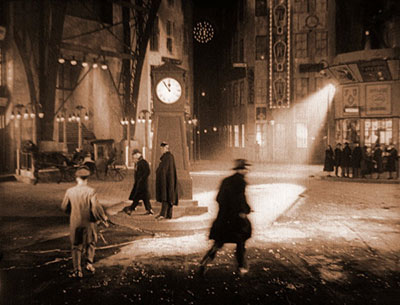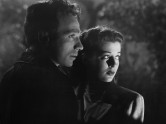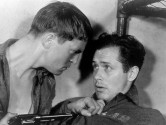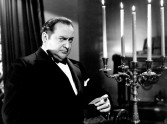
New Year's Eve
(Sylvester: Tragödie einer Nacht)
Screening on Film
With Eugen Klöpfer, Edith Posca, Frida Richard.
Germany, 1924, 35mm, black & white, silent, 66 min.
Print source: Cinémathèque Française
This idiosyncratic rarity is the gem of the whole carte blanche as far as I’m concerned! A Kammerspiele, or middle-class chamber drama, Sylvester is the simple story—I think it’s a comedy, but who knows?—of a man beleaguered by tensions between his mother and his wife during the final hours of a single New Year’s Eve. The domestic action unfolds, elegantly eschewing intertitles, with an extremely mannered expressionism that bizarrely slows itself down to near tableau-like immobility at times. The performances, often brisk, can just as often be so slow, and the actors’ poses held so long, as to be exciting, electrifying even! The closer the three strange thespians come to stock-stillness, the more they somehow approach the uninhibited language of dance, and one doesn’t even care if the intended result is comedy or tragedy—it’s somehow both in this oddball ellipses-drunk film. Director Pick is a startling revelation, a true eccentric with a singular filmic voice. This forgotten actor/filmmaker, I aver, was as great as kino immortal F.W. Murnau, his comrade in virtuosic German camera movement, tonal innovation and untimely death—they died separately but four days apart in 1931. What couldn’t they have achieved if granted just another ten years each! Eugen Klöpfer essays the husband role wearing, it seems, the body of someone else, someone that doesn’t quite fit his skin or gait; he is the epitome of bodily and marital discomforts. Edith Posca, Pick’s wife and frequent collaborator, plays the young frau, while Frida Richard takes on the role of the most memorable mother-in-law in film history.
Live Musical Accompaniment by Robert Humphreville




















